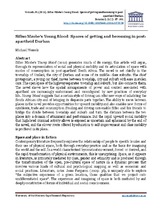Sifiso Mzobe’s Young Blood: Spaces of getting and becoming in post-apartheid Durban
Abstract
Sifiso Mzobe’s Young blood (2010) generates much of its energy, this article will argue, through its representation of social and physical mobility and its articulation of space with modes of consumption in post-apartheid South Africa. The novel is set chiefly in the township of Umlazi, the city of Durban and some of its middle- class suburbs. The chief protagonist, a young car thief, moves between township, city and suburb with ease in stolen cars. The open space of the highway separates township and suburb, but also connects them. The novel shows how the spatial arrangements of power and control associated with apartheid are increasingly undermined and reconfigured by new practices of everyday life. Young blood suggests that a certain style of driving can offer new ways of inhabiting the South African city and of bringing its disparate parts together. The ability to move between places in the novel provides opportunities for upward mobility and also enables new forms of symbiosis, trade and consumption. Stealing and driving cars enable Sifiso and his friends to bridge the divide between township and suburb and turn the distance between the two places into a domain of attainment and performance. But the rapid upward social mobility that high-level criminal activity allows is exposed as uncertain and ephemeral by the end of the novel, and the slower route offered by education to self-improvement and class mobility is proffered in its place.

